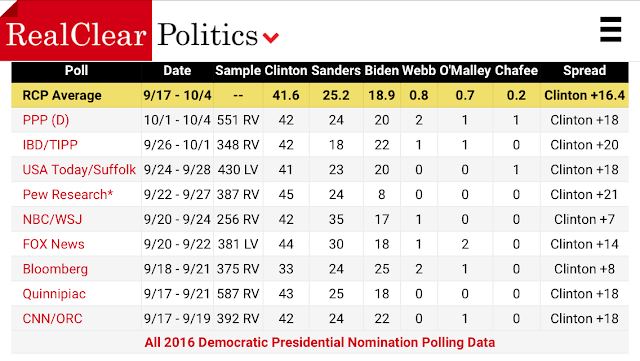"Liberal" media outlet- Slate:
"Conservative" media outlet- The Blaze:
For my "Liberal" media story, I chose a story from Slate.com written this October. In the article, the author discusses how the less known democratic candidates should present themselves in the upcoming debate. For my "Conservative" media story, I chose a story from TheBlaze.com written this past July. In the article the author discusses a group of demonstrators protesting at presidential forum during O'Malley's time on stage. I decided to use stories from Slate and The Blaze based off a Washington Post article that ranked them the most liberal website and the most conservative website.
https://www.washingtonpost.com/news/the-fix/wp/2014/10/21/lets-rank-the-media-from-liberal-to-conservative-based-on-their-audiences/
Over all I didn't really see a huge difference in how O'Malley was portrayed in these stories. It was kind of hard to even find relevant or recent articles on O'Malley on either of these sites. I think that definitely confirms what I've learned in my research so far; not many people even know who Martin O'Malley is. The subtle difference I did notice in the two stories would just be the overall tone of the articles. The Slate article is pretty harsh in the sense that it reiterates the fact that, "This [campaign strategy] has gotten O’Malley nowhere. He has zero traction in polls, and he’s still unknown in much of the country". With that, it still had a hopeful tone discussing how this debate was O'Malley's chance to let America know exactly who he is. The conservative outlet on the other hand wrote an article on perhaps the biggest controversy surrounding O'Malley's run for presidency; the death of African-American man Freddie Gray at the hands of Baltimore police. While Slate also featured articles written about this incident, I was also able to find recent articles about O'Malley and his run for presidency. This was not the case on The Blaze. I think the most recent article under the article I chose was from 2012. I think that is unfair and does contribute to polarization in society and in our political system for several reasons. First, if a conservative user is seeking out information on O'Malley, and the only articles they see about him are ones discussing how people are protesting during his interviews due to the death of Freddie Gray, that will probably lead to them to not thinking highly of O'Malley or just not thinking about him at all. I think it's also a big deal because generally speaking, democrats are supposed to be big on fighting racial inequality, racial profiling, and things of that nature. It really looks bad for a democratic candidate who is supposed to posses these liberal values, to be the face behind a "tough on crime" policy that leads to cases of police brutality and poor treatment of black Americans by law enforcement. It's just another reason for conservatives like my great uncle to make facebook posts ending in "defend this liberals". *actual post from my great uncle, occur daily*
Overall if anyone reads either of these articles they're going to learn about the same thing every article says about O'Malley, that he's low in the polls and that he was involved with the tough on crime Freddie Gray controversy. Its hard to learn about a candidate who doesn't have a decent number of diverse articles written about him.
Resources:
https://www.washingtonpost.com/news/the-fix/wp/2014/10/21/lets-rank-the-media-from-liberal-to-conservative-based-on-their-audiences/







